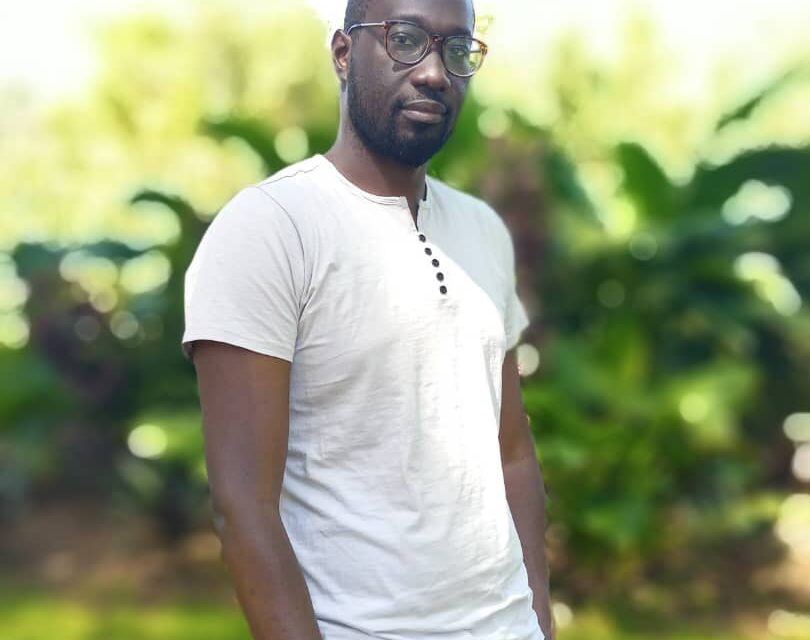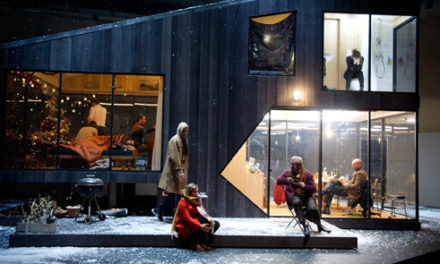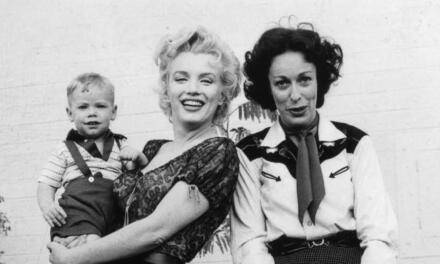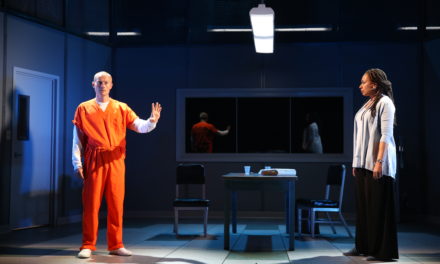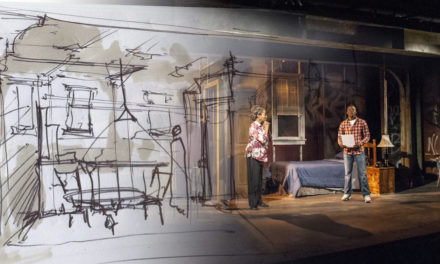Lloyd Lutara (LL) is a multi-form storyteller writing and producing theatre, film, fiction and television. By taking a single story and adapting it for different media, he is breaking the compartmentalization of storytelling. Lutara is one of the three artists recently selected for the inaugural Tebere Arts Foundation Playwriting Residency in Kampala. The African Theatre Magazine (TATM) interviewed him and here is what we learnt . This interview was conducted via an email defying a COVID-19 lockdown to whizz through somewhat desolate Kampala streets.
TATM: Lloyd, I’m pleased to have this conversation with you… and, although we cannot meet in person because of the prevailing preventive measures against COVID-19, I’m sure you are safe…
LL: I am… and encourage everyone to adhere to all preventative measures taken wherever they are.
TATM: First, what does COVID-19 mean to you as a theatre practitioner? And what does theatre lose or gain from this global pandemic?
LL: Well, I had scheduled a dramatic reading of my script at the beginning of April. But then the countrywide lockdown happened. I was disappointed, of course. But in the wake of that, I’ve had the opportunity to dig in and work on another project – which is a film.
Theatre being a communal experience, the pandemic and the restrictions instituted to stem it may have affected it short term. But I have confidence that we will bounce back, and once things settle, people will come to theatres again.
TATM: You’re a storyteller for different media: fiction, screen, stage… all. Tell us: how is this possible? Some people are already finding it hard to do just one thing.
LL: I believe it really comes down to mastery of form and understanding that certain stories are best told through certain mediums. It’s something that takes time and dedication and, which, at least for me, I believe will be a life-long pursuit. I’ve been fortunate enough to find wonderful teachers who have imparted so much knowledge along the way. There’s fiction and poetry writer Beatrice Lamwaka; TV and film producer Matthew Chan Piu; theatre and film maker Angella Emurwon; actress and filmmaker Irene Kulabako, the list can go on and on.
TATM: You’re both into film and theatre. I don’t know what appeals to you most. What I know is that one complements the other. Was it Terrence Mann who said, ‘Movies will make you famous, Television will make you rich but Theatre will make you good’? The challenge, however, is that most young artists who join theatre and later launch into film consequently leave theatre. And this is the dilemma. Because in Africa, both industries are in their infancy. Shouldn’t we be worried about churning out mere jacks of trades or losing talent before they even hit their optimal levels in one particular art form?
LL: I can’t say one appeals to me more than the other. To me they are two sides of the same coin. Terrance Mann is right… well, theatre may not be as sexy as film. And unless you’re a Buddhist monk in the mountains of Nepal, almost everyone wants to live that movie star life. I think the cure for this abandonment of one medium for another is cultivating a crop of artists who understand that just because one is flashier doesn’t mean that one is better. Some, if not all, of my favorite local creatives toggle between both mediums with ease because they understand this.
TATM: You’re in charge of a company, Boda Boda Entertainment. I’m curious about the name and what you do.
LL: Lol… A lot of people ask about the name. My creative partners and I wanted a name that is immediately recognizable and Ugandan to the core. A name which embodies our mission statement completely: to tell stories, to create pieces of art that not only entertain but can go out into the world and represent Uganda.
TATM: One of the problems in theatre – and this is why theatre may not be a very attractive career to young people – is that you guys don’t pay. I’m saying ‘you’ as a presumption for any director, producer who does this. (Not you) Actors are not paid. Instead, young female actors are offered sexual advances. What’s happening and how do we fix this?
LL: It is sad that this is happening. It is actually a problem present in the performance arts industries as a whole – stage, film and TV. I think one of the things this stems from is the fact that at the moment these industries make very little, if any, money. So a producer will cut corners any way they can. While technical personnel will often walk away if you said you’re not paying them, it’s much easier to lure a young actor with the promise of fame. So actors end up taking the brunt of it. As for the sexual harassment of female actors, like in any sector of society, the way forward is to encourage victims to speak up without fear: name these predators and bring them to book.
TATM: Tell us about your work. Particularly your play, A Ghost Story, which I learn is an adaptation of Francis Imbuga’s Betrayal in the City. Why A Ghost Story? Why now?
LL: On the whole, I like using elements of speculative fiction; horror, sci fi, dystopian, fantasy, or of any genre that really grabs my attention, to explore contemporary issues and stories.
As for A Ghost Story, I first wrote the piece in 2017. Like many people, I was frustrated after the previous year’s general elections in Uganda. I felt I needed to vent my anger. Otherwise it would consume me. I first wrote and produced a short film. ‘Day 256’. That imagines the country plunged into civil war after the 2021 elections. But that wasn’t enough.
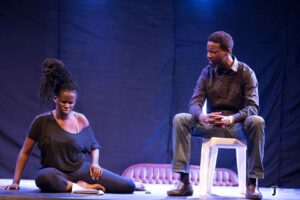
Lloyd Lutara’s A Ghost Story, directed by Angella Emurwon in 2018 (Photo provided by Kampala International Theatre Festival)
Around that time, Dr Stella Nyanzi was arrested for writing a Facebook post in which she called President Museveni ‘a pair of buttocks’. When the State attempted to have her for a psychiatric examination on claims that she had run mad, NTV Uganda quoted Betrayal in the City on their social media: ‘When the Madness of the entire nation disturbs a solitary mind, it is not enough to say the man is mad’. This struck a chord and I went searching for the play. It stunned me how reading a play written 40 years prior was like reading the headlines of our newspapers. It is at that moment that I knew I had to write the adaptation. With time it has grown past an adaptation.
TATM: What is your current theatre project and what should theatre audiences expect from you in the next five years?
LL: The project I’m currently working on is titled Rope. Rope is about the daughter of a tycoon who goes missing and the investigation to find her. I am using it to explore toxic masculinity, gender roles, sexual repression and class. In terms of form, it’s an experiment to see how I can take a single piece and present it across multiple platforms with minimal or no adaptation. So it will be presented as a theatre piece, a web series, a feature film and an audio series.
The next five years? What can I say? Tomorrow will take care of itself. I guess… more work that tries to be more experimental in form and content… where I continue to tell stories that matter to me.
TATM: What, in your own view, is the role and place of the African Theatre artist in this age?
LL: I think the role of any African artist and storyteller regardless of discipline is to tell our own stories. Our story has been told by people who have no right to for too long. It’s time for us to reclaim it and tell it in our own voice.
TATM: Can you cite a show you have lived to remember and tell us why it stands out for you?
LL: It might seem like fanboying since I consider her a mentor, but Angella Emurwon’s play Strings is one of those pieces of art that truly stays with you. It’s beautifully written, wonderfully acted, and even though it tackles some hard topics – finding purpose, what is a father and is education the only road to success – it’s rolling in the isle funny. For me, Emurwon’s Strings is at the forefront of Ugandan theatre today and I’m sure most theatre lovers would agree.
TATM: If you were to meet in real life just a character from one African play, who would they be, and what would you do or tell them?
LL: Seeing as I spent so much time with him and who he eventually became in A Ghost Story, I would meet Jusper from Betrayal in the City. I’d want to sit down with him and ask him what he thought about what was going on, 40 years later.
TATM: Any last word you would want to share with our amazing readers?
LL: Hmm… that this time will pass and when it does let’s fill our theatres.
TATM: Mr. Lloyd Lutara, I must say it is my sincere thanks and pleasure to interview you. Stay safe and keep creating.
LL: I’m forever humbled, thank you.
With his multi-form project, Rope, one can’t wait to see how Lutara’s story skips from one form to another to give new meanings in its every artistic mutation, for this is what real art does.
This article was originally published at The African Theatre Magazine and has been reposted with permission. To read the original article, click here.
This post was written by the author in their personal capacity.The opinions expressed in this article are the author’s own and do not reflect the view of The Theatre Times, their staff or collaborators.
This post was written by James Montaño.
The views expressed here belong to the author and do not necessarily reflect our views and opinions.

